Overseas Case: Centre national de la recherche scientifique (France)
Using Focused Research and Training to Build a Brighter Tomorrow
The unique ‘thematic schools’ and ‘Unit Training Plan’ of CNRS, the research organization of the French state that ranked second on the 2021 Nature index of leading government institutions, are responsible for its frequent appearance in the top five positions of multiple international rankings. Ms. Christiane Ename and Ms. Hélène Lebas of the Human Resources Department and Mr. Edouard Besserve of the International Cooperation Office work closely with researchers and non-research staff at CNRS and help them develop their skills and careers.
Abstract
The Centre national de la recherche scientifique (CNRS) is the research organization of the French state. CNRS has a robust team specifically catering to researcher training and development every year. One of their main ventures is ‘thematic schools’ that focus on a particular research theme. Scientists at CNRS get the change to use these thematic schools to obtain training in the latest research in the field, speak with experts, and collaborate with one another. The individual training plan for every laboratory called a ‘Unit Training Plan’ focuses on how each researcher in the lab wants to develop their career, as well as what skills the lab needs to improve its research work. Together, these and other plans help researchers develop their own scientific knowledge, gain the latest skills and techniques, and improve their careers.
Interviewees’ Bio
CNRS is the largest fundamental science agency in Europe with over 1,144 laboratories and 33,000 researchers. Ms. Christiane Ename and Ms. Hélène Lebas of CNRS are deeply involved in researcher development and training, and Mr. Edouard Besserve works in the International Cooperation Office of CNRS.
- Ms. Christiane Ename is head of the service formation et itinéraires professionnels (SFIP), i.e., the training and career paths department, of the Human Resources Department of CNRS.

- Ms. Hélène Lebas is responsible for the professional development service for researchers (service du développement professionnel des chercheurs) at the Human Resources Department of CNRS.
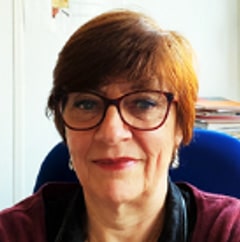
- Mr. Edouard Besserve is deputy director for Asia, European Research and International Cooperation Office at CNRS.
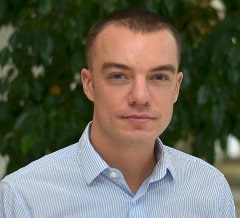
Providing researchers with the tools to build their professional careers
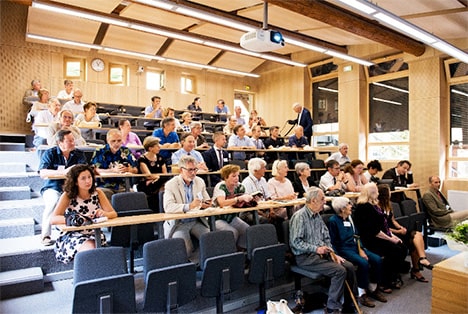
Participants in the new lecture hall at Ecole Des Houches, the CNRS thematic school for physics (Image courtesy: CNRS)
Training is a major requirement of any job, and more so for a career in research and research-adjacent fields, which are constantly changing and growing. However, active researcher development and training beyond the guidance provided by senior researchers is something very few rare universities and institutes consider as an active requirement. CNRS is one of these institutes.
Researcher development at CNRS started a long time ago. Here, training, evaluation, career advancement, bonuses, and overall recognition has always been incorporated into the career development of researchers. Ms. Lebas and Ms. Ename are part of a team that works on assessments, bonuses, promotions, and individual support for researchers, and is supported by Mr. Besserve of the International Cooperation Office. They help researchers examine their professional objectives and projects through workshops to provide researchers with a toolbox to build professional projects.
CNRS has 102 thematic schools every year, in all scientific areas. When researchers have an idea, or they want to explore a scientific theme, they discuss the matter with their own team and put forward their project proposal in a document. These project proposals are read by a person in the institute that matches the direction in which the researcher wants to study. They then pick the projects that match with the overall research themes. This brings in 102 projects in total. After this, the team decides on fund allocation. The researchers and CNRS employees that are interested in particular themes go there for free. This allows them to be trained in all scientist areas. They produce publications, sometimes they get partnerships, sometimes the projects can merge, and sometimes they even invite experts from the themes that they are working on. After the schools, they can publish, they can have partnerships, and they can enhance their research. The schools have quite a lot of success.
CNRS has an online record of the schools going back for about seven or 10 years that shows what kind of themes they have focused on, and the schools and institutes related to that theme.
CNRS considers training the same as work time
The team at the Human Resources Department works with a French-state funded budget of €9 million, which is spread out across all 33,000 people in service. Of this, €1 million is reserved for thematic schools. The rest is used for different trainings.
In all enterprises in France, the amount of money spent on training is equated to the payroll. When researchers or CNRS employees go on training, they are going on their work time. Thus, in a rough estimate, about 1.5% to 1.7% of the payroll at CNRS goes towards training.
Training researchers for tomorrow
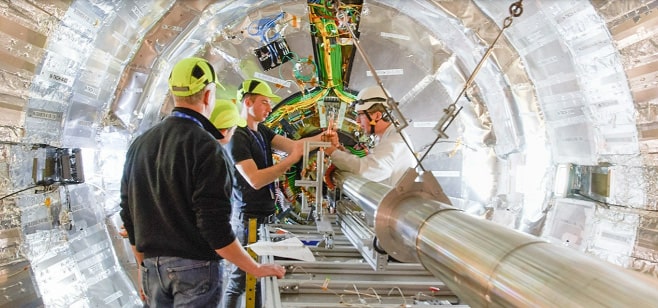
Each laboratory in CNRS is considered a unit, and training plans are drawn up with their specific needs and skill-requirements in mind (Image courtesy: CNRS)
As the CNRS careers website states, “training means being an actor in one’s career.” The actors at CNRS—the people, the agents, the directors—are given a say in the kind of training they want for their personnel. Then, a Pluriannual Strategic Training is conducted with orientations and objectives that match the needs from the various actors, the CEO of CNRS, the HR directors.
The first objective is to train researchers for tomorrow, and this includes training in areas that are new for the researchers. The second is to have trainings for people development and self-development, and this includes a person’s career goals as well. The third objective is to develop the actors in training. For example, five years ago the team anticipated the need for digital and computer science training and has been working on how to build e-learning sessions. Even three years ago, it was hard to convince people of this requirement, but with the pandemic, of course, its effectiveness has been proven.
Training must meet the needs of the laboratory as well as individual researcher goals
For structuring training, CNRS has used a unique solution. The Unit Training Plan is a specific plan written by the head of the unit, which can mean a lab, a department, or a designated team of non-research staff at the university. The Unit Training Plan as two parts: one part in which the agent expresses what their own trainings are, and the second part for the manager or director of the unit to request the skills and trainings for their unit to achieve its project. A group of 70 training counsellors who oversee scientist training studies these unit plans, comes to the team at Human Resources, and submits their proposals along with the estimated budget requirements.
Flexible dates for training are important for work-life balance
The training programs occur at a larger scale, but there is an emphasis on their inclusions in a regular workday as well, particularly with the aim of improving work-life balance. French institutions consider training to be equivalent to work time. At CNRS, about 50% of the employees attend at least two days of training per year on an average.
Some trainings are compulsory because they are requested by the director and are required for the project, but others are flexible, and people can choose the date and time at which they go and get trained. This choice brings a greater emphasis on work-life balance.
E-learning and in-person training can be mixed and optimized
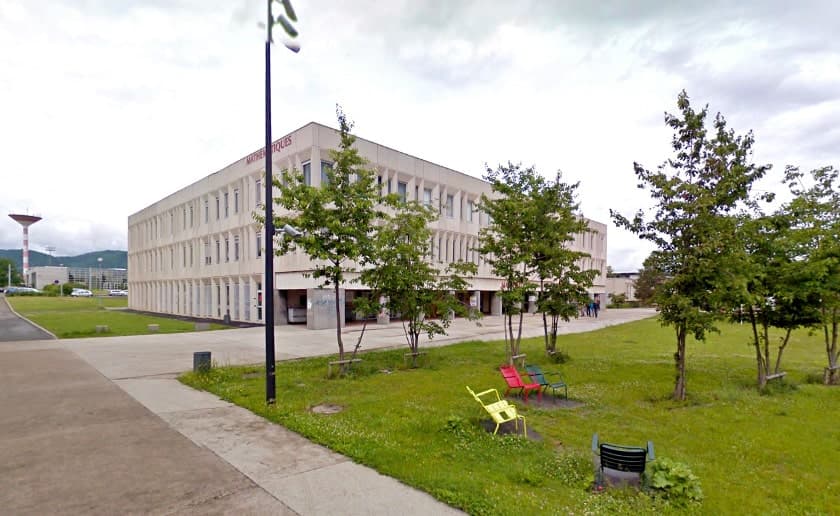
The CNRS thematic school for mathematics at Saint-Flour is a world-renowned summer program (Image courtesy: CNRS)
The team has achieved a lot and is planning on even more. To take researcher development at CNRS even further, they suggest more e-learning modules of training, in combination with in-person training, which allows for flexibility. The team also believes a larger range of trainings should be offered so that people can choose to be trained in the skills they want for the career progression or research progression that they desire.
The participation rates for all kinds of training sessions (national trainings, thematic schools, and regional trainings) include 69–70% for engineers and other CNRS employees and 20-21% for researchers. These training events are regularly tracked. If you look specifically at thematic schools, 80% of the trainees are researchers, and a thematic school lasts five days on an average. The participation rate for researchers is lower, as the time they spend in the lab is considered to be an ongoing training. Other non-research trainings are also on offer for researchers to develop integral skills like lab management or on how to develop partnerships.
Training people to enable them to train others
CNRS has an annual career plan, and as part of the upcoming annual cycle, they are working on developing ‘internal occasional trainers.’ Training sessions can either be conducted by companies or one of the peers at CNRS. These peers are called internal occasional trainers. This concept has been executed at CNRS for over 10 years, but these peers do not get any official guidance on how to train people. A recent survey conducted among the 600 internal occasional trainers of CNRS showed that they are interested in guidance beyond the four-day training in pedagogy they receive. CNRS aims to now provide them with the tools to build e-learning sessions. People appreciate being trained by their peers. Thus, if someone is an expert in an area and wants to train others, the team gives them training that enables them to do that.
Training is just a tool to achieve the vision of the institution
Training, the team believes, is only a tool to reach an objective. It must be used as a strategy by the institute to execute its vision. To do this, the first step needed is to be clear about the vision, the strategy, and the objectives of the researcher development or training. One should try to see what skills are needed and what skills the institute does not have. Then one can see how these gaps can be met.
Sometimes, the answer is not training but more information or a communication session. What’s more, not anyone can provide training; for this, people who work in the area of training and scientists that are sensitive to training are needed. This has to be done in collaboration with people who have the scientific knowledge to decide which research themes are worth conducting trainings in.
Getting researchers on board with the idea of training is also important, as some are reluctant to move beyond traditional research training. For this, first training a few interested people is the key step; these people will then become ambassadors for the training program and inspire more researchers to follow.
Interview date: November 2021
Interview cooperation: Cactus Communications
